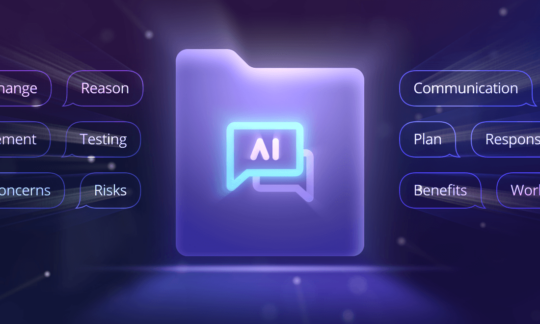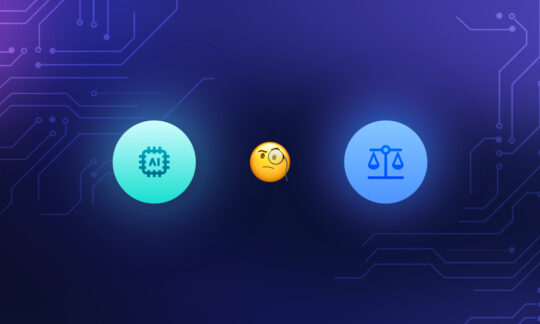Checking in for better service – chatbots in hospitality
Table of contents
Hotels have gone digital in the past years. After online booking, custom mobile apps and smart rooms, virtual assistants seem like a natural next step in improving customer care. Learn about the use cases and prospects of chatbots in the hospitality sector through this article.
As the world’s digital transformation progresses, customers are relearning their journeys and — in turn — rediscovering their expectations. Businesses are well aware of this ever-evolving environment and the necessity of embracing these changes. A 2020 study by Accenture found that 77% of CEOs seek to change their client relationship strategy entirely.
In search of enhanced customer experiences and effective omnichannel strategies, companies put their hope in AI automation. Virtual assistants increase the availability of services and cut costs while offering unprecedented scalability and flexibility. Evolving Natural Language Understanding (NLU) engines ensure their interactions feel natural, intuitive and helpful.
To be fair, the hospitality industry is no stranger to this tech. Marriott International was one of the trailblazers, launching its virtual assistant in 2017. Conversational AI may have already looked promising back then, but only a few people could have predicted the rapid pace of its growth or the accelerated digitalisation that came with COVID-19.
Today, hotels are facing an entirely different landscape. Accurate NLU engines and the growing AI market made automating customer service cost-effective and accessible.
Hoteliers anticipated chatbots use in the hospitality sector would grow by 53% in 2022. Research should soon confirm whether they were right about the exact numbers, but one thing seems sure: conversational AI has entered the hospitality industry for good, and it’s not going anywhere
Virtual room service — AI hospitality agents and their use cases
Booking
Booking.com pioneered the use of chatbots in hospitality for… well, bookings by integrating one into its platform in 2017. Their chatbot assisted guests with common questions throughout the process and immediately proved a popular and valuable tool for the customers.
A virtual hotel assistant can enhance the booking experience considerably by providing personal and prompt support. The ability to handle common guest queries throughout the entire booking process increases completed bookings and reduces cancellations. Instead of having to make phone calls, guests can simply type their questions and receive instant feedback, leading to a more seamless and efficient booking experience.
With the chatbot’s help, checking in online, changing check-in dates, and other tasks are now just a few clicks away. Streamlining the administrative side of hospitality has allowed businesses to offer guests a more personalised and enjoyable experience.
Multi-language support
Breaking down language barriers is crucial to providing guests with a seamless experience. Chatbots offer 24/7 support in multiple languages, eliminating communication problems and enhancing the guest experience. It can affect your bottom line, given that research indicates 40% of customers will only purchase from businesses that support their language.
With multilingual AI bots, you can eliminate these barriers, serve a broader customer base and boost sales. Speaking to customers in their native language, with quick answers to their questions, makes you stand out from competitors.
Our Automate chatbot engine can effortlessly and efficiently converse in 7 languages: English, Polish, German, Spanish, Arabic, Italian and soon, French.
Up-sell and cross-sell opportunities
AI chatbots can enhance the customer experience by recognising their needs and providing personalised advice. They can ask about the purpose of travel, personal preferences, and travel party size to recommend the best room or package. These virtual assistants can guide customers through the booking process, including suggesting upgrades or added amenities.
Chatbots can also enhance guests’ stays by recommending extra services like restaurant reservations, spa packages, and excursions. They can arrange car rentals and sightseeing tours, making it convenient for guests to have everything they need during their stay. Automating cross-selling and up-selling processes boosts hotel profits and personalises the guest experience. It brings us to:
Personal concierge
71% of consumers expect personalised interactions, and 76% get frustrated when this fails. Clients desire relevant recommendations, targeted promotions, and attention through follow-ups and reminders. Finding the right approach can improve performance and enhance customer satisfaction.
Chatbots can personalise hotel customer service by utilising customer data and analysing past interactions. It leads to a more tailored experience, increasing customer satisfaction and loyalty. AI can greet customers by name, recommend services based on their preferences, and assist with post-booking services, such as reservations or activities.
Virtual assistants can act like personal concierges who never sleep and are available 24/7 to answer questions and provide help. This constant availability creates a sense of personal attention while making it easier for guests to get the assistance they need.
They can also play a vital role in promoting hotel loyalty programs by offering guests recommendations and incentives based on their past stays. Chatbots provide updates on loyalty points and rewards, answer questions about program benefits, and help guests redeem rewards.
The bottom line — how chatbots for hotels improve businesses
We’ve established that virtual assistants improve personalisation, which data shows is essential to customer satisfaction. However, it is worth noting that respondents highlighted the quick resolution of issues ranks as the second most significant factor. As it happens, chatbots excel in this area with 24/7 availability and instant responses, providing peace of mind for guests by immediately addressing their needs.
There is, however, another crucial component to AI’s superior accessibility — and that’s its
Omnichannel potential
Chatbots offer hotels a powerful tool to reach guests on their preferred channels. AI-powered virtual assistants can integrate with social media platforms, instant messaging apps, and more. Streamlining communication onto one platform simplifies management and makes it easier for staff to oversee guest inquiries.
This omnichannel accessibility can help hotels improve their service while reaching a wider audience. It allows guests to get help instantly, wherever and however they choose to reach out. Whether through Facebook, Instagram, WhatsApp, or another platform, chatbots offer a flexible and convenient way to get the support they need.
Increased direct bookings
Hotels aim to boost direct bookings to save on commission fees and increase profits. A hotel chatbot can be a powerful tool to achieve this. By promptly answering guests’ queries, virtual assistants guide guests through the booking process, reducing friction and making the experience seamless.
They also offer round-the-clock accessibility, making it convenient for guests to book at any time. These benefits make chatbots an effective solution for hotels looking to boost direct bookings and increase conversion rates on their part. Multichannel presence helps as well.
Increased revenue
With increased direct booking comes revenue growth and reduced commission costs. Chatbots can improve sales further and optimise upselling by presenting relevant offers and discounts to guests. Their ability to upsell effectively with personalised suggestions enhances the guest experience, leading to higher spending and increased profits.
Eliminating language barriers with multilingual AIs helps hotels reach more customers worldwide. To sum up, by increasing sales, boosting communications, streamlining operations and reducing customer service costs, chatbots can maximise the hotels’ revenue.
The reduced workload of customer service staff
Chatbots can handle standard customer service tasks, like answering policy questions, giving directions, taking reservations, freeing staff for complex inquiries and concierge services. Chatbots also offer 24/7 availability, handling queries via social media and other platforms. It frees up customer service staff to tackle more complex cases.
Less staff needed for routine tasks reduces labour costs by lowering the need for overtime pay. Allocating the team to more complex tasks improves service quality and customer satisfaction, which enhances customer retention and increases profits even further.
All of this sounds pretty great, doesn’t it? ‘So, is there a catch?’ you might wonder. Well, there doesn’t have to be, but you must remember that:
Not all chatbots for hotels were created equal
Here are some essential factors to consider when choosing the right conversational AI for your hospitality business:
- Multichannel integrations: multichannel chatbots allow businesses to reach clients on multiple platforms, increasing their reach and accessibility. This way, companies can personalise their customer journeys and respond to inquiries on the client’s preferred messaging app. It provides a more comprehensive and seamless experience, leading to higher customer satisfaction.A multichannel chatbot can handle a larger volume of customer inquiries, improving the efficiency of customer service operations. It can give businesses a competitive advantage by offering advanced technology and convenience to customers.
This feature is crucial if you want your AI hospitality agent to enhance your hotel’s omnichannel strategy.
We’re proud to say that Automate, the NLU and chatbot engine we are developing here at SentiOne, offers convenient multichannel bot integration possibilities. These include platforms such as WhatsApp, Messenger, Telegram, websites etc.
- Multilingual AI bots: As a business owner, you want to provide the best possible experience for your guests. With a single-language AI, you risk alienating a large portion of your customer base who don’t speak the language. By choosing a multilingual chatbot, you can offer 24/7 support in multiple languages, ensuring seamless communication and a positive experience for all guests.As we’ve mentioned, 40% of customers won’t purchase from businesses that don’t support their language. It can have a significant impact on your bottom line.
Investing in a multilingual chatbot distinguishes you from your competitors, demonstrating that you value diversity and inclusivity. With the Automate chatbot engine, you can converse in 7 languages: English, Polish, German, Spanish, Arabic, Italian, and soon, French.
- Cloud versus on-premises hosting: You can host chatbots in two ways — on-premise or through cloud computing.On-premise hosting means that the company stores and maintains the data, which can be costly but provides better reliability, security and complete control over the data.
On the other hand, cloud computing allows for cost-effective storage with a third-party server and the convenience of quick deployment and scalability. However, it also raises concerns about data ownership and security, with studies showing that nearly 98% of companies have experienced cloud security breaches.
It’s necessary to weigh the benefits and risks of both hosting options when deciding how to store sensitive customer information. Compliance with data protection laws like GDPR in the EU or HIPAA in the US can be challenging when integrating chatbots with third-party platforms.
SentiOne focuses on on-site hosting, giving enterprise companies maximum security and complete control over their data and conversation records. Furthermore, our solutions are fully compliant with the GDPR.
- Ease of use: SentiOne Automate offers a visual editor and drag-and-drop features that make it easy for non-technical personnel to create sophisticated chatbots. You should avoid AI software that requires specialised knowledge. Instead of hiring skilled developers and a dedicated maintenance team, look for low-code platforms that give you peace of mind. Ones that come with user-friendly interfaces for deploying and maintaining your AI.
- Intent recognition accuracy: Your bot must train on large datasets to work. High intent recognition accuracy ensures your chatbot accurately understands the customer’s needs and provides relevant information and support. Your virtual assistant must improve customer experience instead of becoming an annoyance and wasted opportunity. With an AI engine with high intent recognition accuracy, customers will trust your bot, increasing overall engagement and customer loyalty.SentiOne Automate achieves a 94% intent recognition score, meaning it is one of the most accurate NLUs on the market. It can understand human intents and motivations almost as accurately as humans!
Real-life stories of chatbots in the hospitality industry
The Equinox Hotel New York
The Equinox Hotel New York, a luxurious lifestyle destination in Manhattan’s Hudson Yards, was searching for a solution to drive exponential conversions and enhance its customer experience. They partnered with Haptik to create Omar, an intelligent virtual assistant. With 24/7 customer support, fast room booking processes, and easy service discovery, Omar automated 85% of their customer service within months of its launch. Not only did the chatbot successfully handle thousands of customers, but it also generated multiple leads, showcasing its impact and effectiveness.
OYO Hotels & Homes
OYO Hotels & Homes, established in 2013, is a leading global chain of hotels, homes, managed living spaces, and workspaces.
The company wanted to enhance its customer support by offering it over WhatsApp and enabling its Guest Experience Managers to respond to customer queries through the messaging platform. The goal was to reduce support costs by deflecting call centre traffic and enabling support staff to manage customer interactions at scale.
A seamless integration of a virtual assistant platform with OYO’s WhatsApp Business account allowed for handling multiple conversations simultaneously and providing swift resolution to customer issues. Staff could also measure the productivity and efficiency of individual support agents and gather data on the top reasons for customers seeking support.
The result? The chatbot engaged 55,000 monthly unique users and reduced call centre traffic by 15%. OYO observed a significant reduction in the volume of calls to its customer care helplines since implementation.
Hotel Indigo
Hotel Indigo, a chain of elegant boutique hotels, was on a mission to enhance customer satisfaction and offer a truly unique experience for their guests. Recognising the importance of personalisation, they sought to create a virtual assistant who would serve as a ‘neighbourhood host’ for each hotel location.
This host would share stories about the local neighbourhood, from the best local food to hidden monuments and the perfect spots to post on Instagram. In addition, the virtual assistant needed to take care of basic tasks such as check-ins, check-outs and simple requests.
With this goal in mind, Hotel Indigo successfully launched three Facebook Messenger bots serving as local tour guides, arranging activities, discovering local cuisine, and keeping guests entertained. Not only do they provide recommendations, but they also help guests with reservations and appointments.
Implement AI bots yourself
Here at SentiOne, we aim to build bots that understand natural spoken language the way humans do. Thanks to access to large datasets from social listening and a dedicated R&D team of AI engineers and linguists, our SentiOne intent detection engine achieves an accuracy of 94%.
With a vast library of critical phrases and intents for the hospitality industry, we are creating a dedicated NLU engine for virtual hotel assistants. If you’re interested in implementing chatbots in your business, look no further. SentiOne Automate will help you utilise AI potential and build a chatbot fully tailored to your guests’ needs.
Learn more about the SentiOne Automate, or talk to us if you want to try it out.



